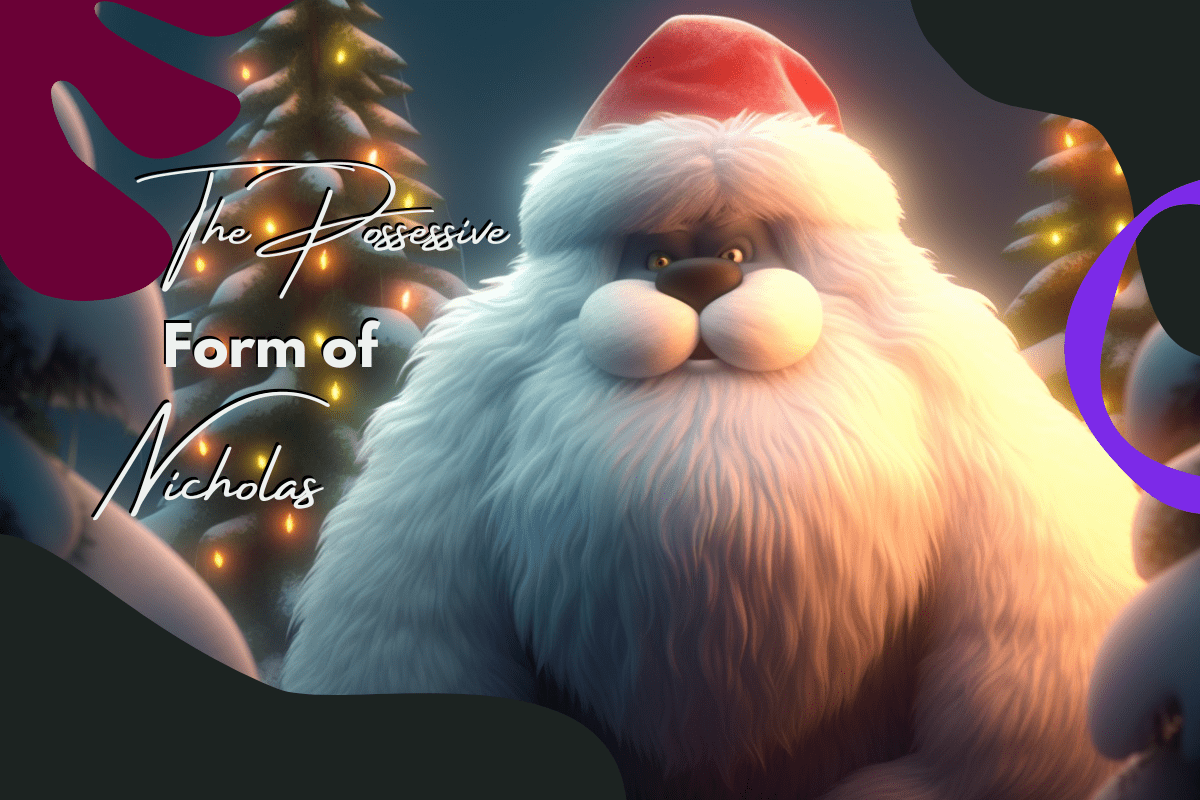Picture this: you’re midway through crafting a heartfelt email to your good friend Nicholas, recounting that unforgettable time you both discovered his secret passion for knitting.
You’re typing away, chuckling to yourself, when suddenly you hit a grammatical snag. Your fingers hover above the keyboard, your mind racing as you try to recall the correct way to write the possessive form of Nicholas.
Was it “Nicholas’s”? Or perhaps “Nicholas'”?
Fear not, dear reader! You’re not alone in this grammatical quagmire. Many have faced the perplexing possessive form of Nicholas and emerged victorious. Here’s what you need to know to conquer this possessive conundrum.
Key Takeaways
| Topic | Description |
| Possessive Form of Nicholas | “Nicholas'” and “Nicholas’s” are both accepted in the United States, depending on the style guide being used. |
| UK and Australia | In the UK and Australia, the preferred form is “Nicholas’s,” as it aligns with leading style guides in both countries. |
| When to Use “Nicholas'” | Use “Nicholas'” when following the Associated Press Stylebook or writing within the realms of journalism and public relations. |
| When to Use “Nicholas’s” | Use “Nicholas’s” when following other style guides like The Chicago Manual of Style, The New York Times Manual of Style, etc. |
| Choosing Possessive Form | If no style guide applies, choose one form and be consistent. Consider the formality of the writing and the setting. |
| “Nicholas’s” vs. “of Nicholas” | Using “Nicholas’s” is more concise and clear, whereas “of Nicholas” can be more cumbersome and less direct. |
| Possessive vs. Contraction | Context is key: If “Nicholas’s” precedes a noun, it’s likely possessive; if followed by a verb, it’s a contraction. |
Table of Contents
What Is the Possessive Form of Nicholas? Is It Nicholas’ or Nicholas’s?
The possessive form of Nicholas can be written as either “Nicholas'” or “Nicholas’s” in the United States. Both forms are correct, but the choice depends on the style guide used. Some style guides, such as the AP Stylebook, recommend using “Nicholas'” with just the apostrophe, while others, like the Chicago Manual of Style, advocate for “Nicholas’s” with an apostrophe and an “s.”
In the United Kingdom and Australia, the possessive form of Nicholas is predominantly written as “Nicholas’s” with an apostrophe and an “s.” This preference is based on the leading style guides in both countries, such as The Oxford Style Manual in the UK and the Australian Government Publishing Service (AGPS) Style Manual in Australia. These guides emphasize consistency and clarity, recommending the use of an apostrophe and an “s” for possessive forms of names, regardless of their ending.
Mastering Nicholas’: When Should You Use It?

First things first: if you’re a die-hard fan of the Associated Press Stylebook or find yourself working within journalism and public relations, you’ll want to stick to using “Nicholas'” as the possessive form of Nicholas.
This style guide is widely used and prefers keeping things concise and to the point, like that perfectly timed joke at a dinner party.
Think of the AP Stylebook as the ultimate guide for journalists and PR professionals. It’s like a trusty compass, ensuring writers create consistent, easy-to-read content while navigating the vast seas of the written word.
By following its guidelines, writers can avoid the dreaded wrath of their editors (and readers) and ensure their work is accessible to readers from all walks of life.
Five Examples of “Nicholas'” in a Sentence
After the knitting fiasco, Nicholas’ enthusiasm for yarn only increased, leading him to open a yarn shop.
Nicholas’ secret collection of cat memes was the envy of all his friends, making him the go-to guy for feline-related humor.
Nicholas’ love for pineapple on pizza was a controversial topic at family gatherings, sparking heated debates over dessert.
The mysterious disappearance of Nicholas’ favorite socks remained unsolved, even after consulting the best sock detectives.
Little did they know that Nicholas’ hidden talent was his ability to recite the entire alphabet backward while standing on one foot.
Celebrating Nicholas’s: When Should You Use It?

For those of you not bound by the AP Stylebook, you’re in luck! Most other style guides, like The Chicago Manual of Style, The New York Times Manual of Style and Usage, and The MLA Handbook, favor the “Nicholas’s” possessive form. To better understand their influence and where they are used, let’s have a quick glance at these other style guides.
- The Chicago Manual of Style: A go-to guide for book authors, editors, and publishers, it’s famous for providing comprehensive guidance on style, citation, and even grammar. It’s the heavyweight champion of the publishing world.
- The New York Times Manual of Style and Usage: Tailored for journalists and writers at The New York Times, this guide helps maintain the newspaper’s high writing standards, ensuring each article shines like a polished gem.
- The MLA Handbook: A must-have for students and scholars in the humanities, it provides guidelines for formatting research papers and citing sources. Its wisdom is sought after in the hallowed halls of academia.
Five Examples of “Nicholas’s” in a Sentence
Nicholas’s choice of karaoke songs was as eclectic as his taste in pizza toppings, with everything from opera to rap.
The neighbors never suspected Nicholas’s gardening skills were the secret to his oversized tomatoes, but they couldn’t resist asking for his secret recipe.
Nicholas’s devotion to his pet rock collection was unwavering, despite the occasional eye-roll from his friends who just didn’t understand the allure.
During the potluck, Nicholas’s legendary seven-layer dip made its triumphant debut, leaving guests clamoring for the recipe.
Nicholas’s quest to learn the art of juggling chainsaws was met with both admiration and concern, especially from those who had seen his previous attempts at juggling.
Choosing Your Possessive Path: What to Do If No Style Guide Applies?

So, you find yourself in a sticky situation: there’s no specific style guide to follow, and you’re left wondering which possessive form of Nicholas to use. Don’t fret, dear reader, for we’ve got you covered!
When in doubt, remember this golden rule: choose one form and be consistent.
Let’s explore why consistency is crucial and how the setting plays a significant role in your decision.
Consistency: The Backbone of Good Writing
Just like a well-rehearsed dance routine, good writing relies on consistency. When you’re consistent in your use of the possessive form of Nicholas, your readers can glide through your text without stumbling.
Consistency helps avoid confusion and ensures your message comes across loud and clear, like when you belted out your favorite song in the shower, much to your neighbor’s dismay.
The Setting Matters: Formal vs. Informal
When deciding which possessive form of Nicholas to use, consider the context and formality of your writing.
For more formal settings, such as academic papers or official documents, “Nicholas’s” might be the safer bet. It aligns with the majority of style guides and conveys an air of sophistication, like a perfectly tailored suit.
On the other hand, if you’re writing for a less formal setting, like a website or social media post, “Nicholas'” could be the way to go. It’s shorter, more concise, and gives off a relaxed vibe, like your favorite pair of jeans.
In Doubt? Choose “Nicholas’s”
If you’re still unsure about which possessive form to use, opt for “Nicholas’s.” As mentioned earlier, it’s the preferred choice for most style guides, and using it demonstrates that you take your writing seriously, like a dedicated athlete training for the big race.
Plus, when you choose the more formal option, you show your readers that you care about the finer details and the quality of your writing.
Apostrophe Adventures: Why “Nicholas’s” Trumps “of Nicholas”

Now that we’ve explored the different possessive forms of Nicholas and when to use them, let’s dive into another conundrum: why using the apostrophe and an “s” (Nicholas’s) is a better option than using a construction like “of Nicholas” (the rubber duckies of Nicholas).
Grab your metaphorical snorkel, and let’s dive in!
The Power of Brevity: “Nicholas’s” vs. “of Nicholas”
Imagine you’re writing a story about Nicholas’s impressive collection of vintage action figures. Which of these sentences flows better?
Nicholas’s action figures were carefully displayed on shelves throughout his room.
The action figures of Nicholas were carefully displayed on shelves throughout his room.
If you picked the first sentence, you’re onto something! Using “Nicholas’s” creates a more concise, easy-to-read sentence that effortlessly guides readers through the story.
It’s like slicing through a birthday cake with a sharp knife, while the “of Nicholas” construction feels more like using a dull butterknife. The cake’s still tasty, but the process is a bit more cumbersome.
Ease of Understanding: Clear Possession
Another reason to choose “Nicholas’s” over “of Nicholas” is the clarity it provides. By using the apostrophe and an “s,” you immediately signal to your readers who or what the sentence’s subject possesses. It’s like a bright neon sign, telling your readers, “Hey, this belongs to Nicholas!”
Let’s look at another example:
Nicholas’s treasured stamp collection was his pride and joy.
The treasured stamp collection of Nicholas was his pride and joy.
In the first sentence, it’s clear right away that the stamp collection belongs to Nicholas. In the second sentence, the reader has to work a little harder to piece together the ownership.
Choosing “Nicholas’s” helps your readers glide through your writing with ease, like a figure skater performing a flawless triple axel.
Remember that showing possession with an apostrophe and an “s” is exclusive to singular words or names ending in “s.” For plural nouns, the process is different.
To learn more, review this article on possessive forms of words ending in “s” and another one that covers the possessive form of names ending in “s.”
And if you’re interested in other names ending in “s,” check out these articles on the possessive form of Iris and the possessive form of Ross.
The Nicholas’s Conundrum: Possessive or Contraction?

Just when you thought you’d mastered the world of Nicholas and his possessive forms, a wild plot twist appears: “Nicholas’s” can also be a contraction for “Nicholas is”!
Before you throw your hands up in despair, fear not; we’re here to guide you through this grammatical labyrinth. So, let’s explore how to differentiate between the possessive and the contraction.
The Great Divide: Possessive vs. Contraction
When trying to determine if “Nicholas’s” is a possessive or a contraction, context is your trusty sidekick. If “Nicholas’s” precedes a noun, it’s likely the possessive form, indicating ownership. If “Nicholas’s” is followed by a verb, then you’ve got yourself a contraction for “Nicholas is.”
Another helpful trick to differentiate between possession and contraction is to replace “Nicholas’s” with “Nicholas is” in the sentence. If the sentence still makes sense, you’re dealing with a contraction.
Two Examples of “Nicholas’s” as a Possessive:
Nicholas’s unparalleled collection of mismatched socks left even the most fashion-forward individuals in awe.
The aroma of Nicholas’s infamous garlic bread could be detected from miles away, drawing hungry visitors like moths to a flame.
Two Examples of “Nicholas’s” as a Contraction:
Nicholas’s probably going to win the award for ‘Most Likely to Bring a Cactus to Show and Tell’ this year.
If Nicholas’s planning another one of his avant-garde interpretive dance performances, count me in – said no one ever.
A Transatlantic Twist: Nicholas’ or Nicholas’s in the UK?

As if the world of Nicholas and his possessive forms wasn’t fascinating enough, it’s time to embark on a thrilling, transatlantic adventure! Buckle up, buttercup, because we’re about to explore how the possessive form of Nicholas is used in the UK.
Will the Queen’s English throw a wrench in the works, or will our grammatical journey remain on course? Let’s find out!
A Royal Rendezvous with British Style Guides
The United Kingdom, the land of Shakespeare and scones, has its own set of style guides that differ slightly from their American counterparts. Among the most prominent British style guides are The Oxford Style Manual and The Times Style and Usage Guide.
So, how do these British guides address the possessive form of Nicholas?
Drum roll, please… The answer is: “Nicholas’s”! That’s right, our British friends across the pond generally prefer to use the apostrophe and an “s” to form the possessive of names ending in “s.”
Why “Nicholas’s” Reigns Supreme in the UK
The reason behind the British preference for “Nicholas’s” is simple: clarity and consistency. Using the apostrophe and an “s” for all names, regardless of their ending, creates a uniform rule that’s easy to remember and apply.
Of course, there may be instances where British writers use “Nicholas’,” but generally, you’ll find that “Nicholas’s” is the favored form in the UK.
So, when in doubt, channel your inner Sherlock Holmes and opt for the apostrophe and an “s” while writing in a British context.
G’day, Grammar! Nicholas’ or Nicholas’s in Australia?

Crikey! Our globe-trotting grammar adventure continues, taking us to the sun-soaked shores of Australia. Grab your sunscreen and your wide-brimmed hat because we’re about to discover how the possessive form of Nicholas is used Down Under.
Will our Aussie mates throw another shrimp on the “Nicholas’s” barbie, or will they cheer for “Nicholas'”? Let’s find out!
A Walkabout with Australian Style Guides
As we traverse the Australian linguistic landscape, we’ll encounter a couple of well-known style guides, such as the Australian Government Publishing Service (AGPS) Style Manual and the Australian Broadcasting Corporation (ABC) Editorial Policies. These guides help navigate the rough terrain of Aussie grammar and punctuation.
And the verdict? It’s “Nicholas’s”! Yes, our friends from the Land Down Under generally prefer to use the apostrophe and an “s” to form the possessive of names ending in “s.”
Why “Nicholas’s” Rides the Wave in Australia
The rationale behind the Australian preference for “Nicholas’s” is similar to the UK’s: consistency and clarity. By using the apostrophe and an “s” for all names, regardless of their ending, Australian writers create a straightforward rule that’s easy to remember and apply.
While you may come across instances where Australian writers use “Nicholas’,” the favored form in the land of kangaroos and koalas is “Nicholas’s.”
So, when writing for an Australian audience, tap into your inner Crocodile Dundee and opt for the apostrophe and an “s.”
The Legendary Lineage of Nicholas: A Name Steeped in History

Prepare to embark on a historical journey through the captivating origin of the name Nicholas. This name has a rich and storied past, with its roots stretching back to ancient Greece, its connection to a beloved saint, and its enduring popularity across cultures and languages.
Let’s dive into the fascinating tale of Nicholas and uncover the secrets of its legendary lineage.
A Greek Gift: The Birth of Nicholas
The name Nicholas hails from the Greek name Νικόλαος (Nikolaos), which is believed to mean ‘victory of the people.’ This compound name combines νίκη (nikē), meaning ‘victory,’ and λαός (laos), meaning ‘people.’
An intriguing ancient interpretation suggests that λαός (laos) could also be derived from λᾶς (las), a contracted form of λᾶας (laas), meaning ‘stone’ or ‘rock.’
This interpretation is linked to the Greek myth of Deucalion and Pyrrha, who repopulated the world by throwing stones over their shoulders after a catastrophic flood wiped out humanity.
The Enduring Legacy of Saint Nicholas
Although the name Nicholas predates the famous Bishop of Myra in Lycia, Saint Nicholas, it gained widespread popularity thanks to this beloved figure.
Saint Nicholas, the inspiration for Santa Claus, left an indelible mark on history, and his legacy continues to shape the way we celebrate and cherish the name Nicholas today.
A name mentioned in ancient history, the Athenian historian Thucydides referenced a certain Nikolaos as a delegate during the second year of the Peloponnesian War (431–404 BC) between Sparta and Athens.
The Many Faces of Nicholas: Variations and Diminutives
Nicholas has evolved over time, taking on various forms and diminutives in the English language and across different cultures. Check out the tables below to explore the diverse variations of Nicholas:
English Variations and Diminutives
| Variation | Diminutive |
| Nicholas | Nick |
| Nichol | Cole |
| Nicol | Col |
| Nickolas | Nik |
Variations in Different Languages
| Language | Variation | Latin Translation (if applicable) |
| Greek | Νικόλαος | Nikolaos |
| Spanish | Nicolás | |
| French | Nicolas | |
| Italian | Nicola | |
| Portuguese | Nicolau | |
| German | Nikolaus | |
| Dutch | Nicolaas | |
| Russian | Николай | Nikolay |
| Hungarian | Miklós | |
| Arabic | نيقولا | Niqula |
| Hebrew | ניקולאי | Nikolai |
| Chinese | 尼古拉 (Simplified) | Nígǔlā |
| Chinese | 尼古拉 (Traditional) | Nígǔlā |
| Japanese | ニコライ | Nikorai |
| Korean | 니콜라이 | Nikollai |
| Polish | Mikołaj | |
| Czech | Mikuláš | |
| Swedish | Niklas | |
| Danish | Nikolaj | |
| Norwegian | Nikolai | |
| Finnish | Niko | |
| Icelandic | Nikulás | |
| Turkish | Nika | |
| Bulgarian | Никола | Nikola |
| Romanian | Nicolae | |
| Estonian | Nikolai | |
| Lithuanian | Mykolas | |
| Latvian | Nikolajs | |
| Ukrainian | Микола | Mykola |
| Serbian | Никола | Nikola |
| Croatian | Nikola | |
| Slovenian | Niko | |
| Slovak | Mikuláš | |
| Albanian | Nikolla | |
| Georgian | ნიკოლოზ | Nikolozi |
| Armenian | Նիկողոս | Nikoghos |
| Azerbaijani | Nikala | |
| Kazakh | Николай | Nikolay |
| Macedonian | Никола | Nikola |
| Mongolian | Николай | Nikolay |
| Uzbek | Nikola |
From its ancient Greek origins to its modern-day variations, the name Nicholas has carved a unique place in history. Whether associated with victory, the legendary Saint Nicholas, or its countless adaptations, this captivating name will continue to enchant and inspire for generations to come.
Unlock the Nicholas’s (or Nicholas’!) Enigma: Your Ultimate Guide Concludes
And there you have it, dear grammar aficionados! From the perplexing possessive puzzle of Nicholas’ versus Nicholas’s to the global grammatical gallivanting across the UK and Australia, we’ve delved deep into the captivating world of the possessive form of Nicholas.
We’ve navigated the treacherous terrain of style guides, explored the curious contraction conundrum, and marveled at the rich lineage of the name itself. So, as you set forth into the wild world of writing, let this guide be your trusty companion.
Remember: with the right knowledge and a dash of determination, you can conquer any grammatical challenge and communicate like a true Nicholas’s (or Nicholas’!) master!

